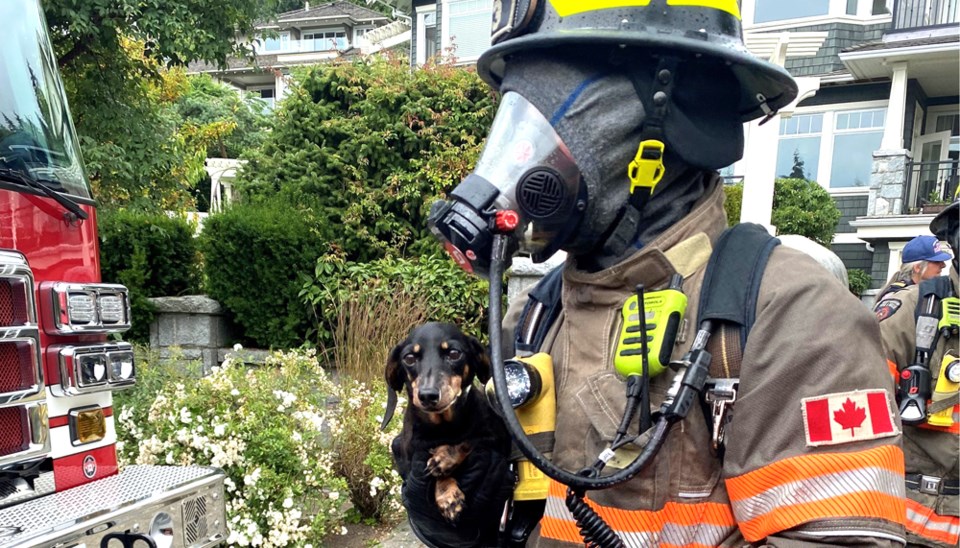UPDATE: Aug. 9, 2022
Investigators now say it was most likely an improperly discarded cigarette that led to a fire at a home in the British Properties, Aug. 2.
West Vancouver Fire & Rescue members were called to put out the flames burning on the exterior of a home on the 2300 block of Dunlewey Place.
Following an investigation, assistant chief Jeremy Calder said there appeared be evidence of a cigarette butt amid the fire debris (although curiously, no one in the house is a smoker).
“That doesn't help explain why there was cigarette material there,” he said. “But the cigarette material being there helps explain why the fire was happening.”
Stubbing out butts in a planter can easily lead to a fire, Calder said, so it is critical to make sure they’re fully extinguished and disposed of before moving on.
“It ignites the mulch, which often smoulders for hours before it ignites,” he said. “People will be in bed or have left the house – now, all of a sudden, the outside of their house is on fire.”
The dry summer months are a busy time for fire crews in the Lower Mainland as casually flicked butts lead to brush fires in yards and on traffic medians, Calder said. There were two other, smaller fires the West Van department was called to deal with over the weekend where improperly discarded smoking material was most likely to blame, Calder said.
ORIGINAL: Aug. 2, 2022
West Vancouver Fire & Rescue members doused a blaze in the British Properties Tuesday (Aug. 2) before it could consume the home or spread to nearby forest.
Luckily, assistant fire chief Garrith Michael and a crew of firefighters were already nearby on a training exercise when multiple 911 calls started coming in for a home on the 2300 block of Dunlewey Place.
Michael said there was heavy smoke and fire coming from the front of a home when they arrived.
“We hit it quick and hard and managed to put the fire out quickly,” he said.
The homeowners were outside, but their dachshund Abby was unaccounted for. Once the fire was under control and it was safe to send members inside, Michael said they found Abby alive but with some injuries in the home’s garage.
“The dog knew the house enough to get to the lowest point. Smart,” Michael said.
BC Ambulance Service paramedics administered oxygen for the pup, which also had a laceration, and Abby was taken to be checked over by a vet.
Michael said anyone dealing with a house fire should fight the temptation to go back in after a pet.
“Re-entering the building puts yourself at greater risk, especially when that time has passed where the fire is able to grow. They did the right thing,” he said. “We will make all efforts to find your pet, as we did here.”
Two of the residents were taken to hospital as a precaution after some smoke inhalation.
Michael said one of the home’s owners had attempted to put the fire out himself with a garden hose, which professionals don’t encourage because it could put individual life safety in jeopardy.
“That’s not advisable. I know it’s your property and you want to protect it, but you’re probably putting yourself at a greater risk in doing that,” he said.
Investigators were still going over the scene on Tuesday afternoon to determine the cause of the fire, Michael said, although they do know it started on the home’s exterior. The inside of the house sustained smoke and water damage, Michael said.
The home is less than 50 metres from the nearest forest interface, which is always worrying, Michael said. According to the Coastal Fire Centre, the danger rating for wildfires was high at the time.
Michael said his department has been putting a lot of emphasis on fire prevention over the last year.
“We’re going around doing risk hazard assessments on homes, and how we can better prepare ourselves for the event of a heatwave and an interface fire,” he said. “We’re fortunate that we don’t get a lot of them, but we are trained. We have the equipment to deal with that.”



